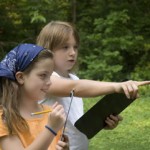 Citizen science has been a topic I’ve touched upon numerous times on this blog, and I’ve written previously about the role it plays in filling gaps in traditional science, and even in keeping researchers honest.
Citizen science has been a topic I’ve touched upon numerous times on this blog, and I’ve written previously about the role it plays in filling gaps in traditional science, and even in keeping researchers honest.
A recent paper highlights how citizens are playing an ever increasing role in scientific research.
“We see that in particular researchers in the natural sciences have collected and classified data with the help of interested volunteers. In the social sciences, there has been a focus on inviting select parts of the public to find out the effects of science on people’s everyday lives. This may for example concern environment problems and risks,” the authors say.
The researchers explored over 2,500 studies that had made use of citizen scientists. They found that certain fields have a long history of using citizens as part of the scientific process, with biology and ecology particularly strong users.
Eyes and ears
For instance, tasks such as animal and plant observation and classification have long been ones that have been ‘outsourced’ to the crowd. This method has been very successful, with huge amounts of data collected that has shed light on things such as the migration patterns of birds.
This kind of work is increasingly important as we attempt to understand the changes climate change is happening on the world. The paper suggests however that this great contribution to science is not one that’s always acknowledged.
“Nobody knows the true extent of it. Scientists have not always communicated that they have received help from the public. But this is changing. It has become more OK to involve the public, and better methods for non-scientist participation have also been created,” they say.
For instance, the analysis discovered that the vast majority of citizen science projects fail to result in a published paper in a scientific journal. The authors are at pains to point out that this shouldn’t be read to mean the quality of work is poor, but rather that the ambitions for the project did not always desire a published paper.
They also suggest there is considerable scope for other fields to utilize a willing and able citizen workforce.
“The humanities have not, with a few exceptions, managed to facilitate broad public participation. And our study shows that we’re still waiting for the big breakthrough in medical research. The hesitation in medicine may have to do with patient safety and issues related to research ethics. But this will probably change in the future,” they say.
If you’d like some help in using citizen science for your own project, then the Collaborative Science website might be a useful start point.
The site was created by a consortium of five universities with the aim of training naturalists in ecology, scientific modeling and adaptive management. They would then be given a space on the site to give students the chance to put their training into action.
If you’d like to learn where citizen science might be going in future, the following talk by Dr Chris Lintott and Dr Brooke Simmons might give you a glimpse.